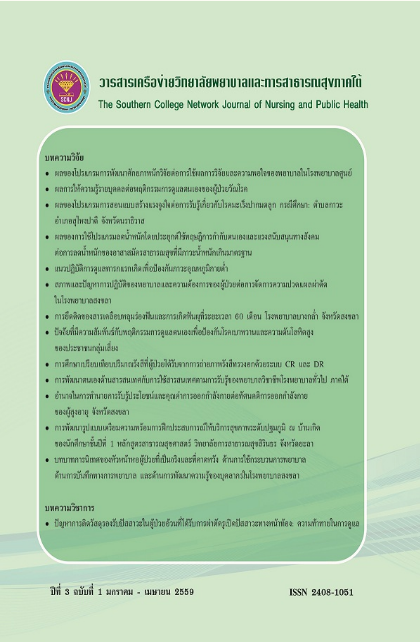ผลการให้ความรู้รายบุคคลต่อพฤติกรรมการดูแลตนเองของผู้ป่วยวัณโรค
คำสำคัญ:
การให้ความรู้รายบุคคล, ผู้ป่วยวัณโรค, พฤติกรรมการดูแลตนเอง, Individual Self-care Behavior Education, Tuberculosis Patients, Self-care Behaviorบทคัดย่อ
การวิจัยครั้งนี้เป็นวิจัยกึ่งทดลอง มีวัตถุประสงค์เพื่อศึกษาความรู้ของผู้ป่วยวัณโรคก่อนและหลังการให้ความรู้รายบุคคล และศึกษาพฤติกรรมการดูแลตนเองของผู้ป่วยวัณโรคหลังการให้ความรู้รายบุคคลที่คลินิกวัณโรค กลุ่มตัวอย่างที่ใช้เลือกแบบเจาะจงเป็นผู้ป่วยวัณโรครายใหม่ที่ขึ้นทะเบียนรักษาที่คลินิกวัณโรค โรงพยาบาลสะเดาทั้งหมด ตั้งแต่เดือน ตุลาคม พ.ศ.2556 - กันยายน พ.ศ.2557 จำนวน 41 ราย เครื่องมือที่ใช้ในการวิจัยครั้งนี้เป็นแบบสอบถามประกอบด้วย 3 ส่วน ได้แก่ ข้อมูลทั่วไป ความรู้เกี่ยวกับโรควัณโรค และพฤติกรรมการดูแลตนเองของผู้ป่วยวัณโรค โดยผ่านการตรวจสอบความเที่ยงตรงเชิงเนื้อหา (Content Validity) จากผู้ทรงคุณวุฒิ 3 ท่าน หาค่าความเชื่อมั่นโดยใช้ค่าสัมประสิทธิ์แอลฟ่าของ ครอนบาค (Cronbachís Alpha Coefficient) และ KR-20 (Kuder Ricardson-20) ได้ค่าความเชื่อมั่นเท่ากับ .95 และ .82 ตามลำดับ วิเคราะห์ข้อมูลโดยใช้สถิติเชิงพรรณนา ได้แก่ การแจกแจงความถี่ ค่าร้อยละ ค่าเฉลี่ย และค่าเบี่ยงเบนมาตรฐาน ผลการศึกษาพบว่า
1. ความรู้เกี่ยวกับโรควัณโรคของผู้ป่วยก่อนให้ความรู้รายบุคคลมีค่าเฉลี่ยเท่ากับ 2.05 (SD=0.54) ภายหลังให้ความรู้รายบุคคลทันที มีค่าเฉลี่ยเท่ากับ 3.68 (SD=0.52) ส่วนหลังให้ความรู้รายบุคคล 2 สัปดาห์มีค่าเฉลี่ยเท่ากับ 4.12 (SD=0.51) ในขณะที่ความรู้เรื่องการดูแลตนเองในชีวิตประจำวัน ก่อนให้ความรู้รายบุคคล มีค่าเฉลี่ยเท่ากับ 2.51 (SD=0.71) ภายหลังให้ความรู้รายบุคคลทันที มีค่าเฉลี่ยเท่ากับ 4.05 (SD=0.70) ส่วนหลังให้ความรู้รายบุคคล 2 สัปดาห์ มีค่าเฉลี่ยเท่ากับ 4.51 (SD=0.51) สำหรับความรู้เรื่องการส่งเสริมการหายของโรคก่อนให้ความรู้รายบุคคล มีค่าเฉลี่ยเท่ากับ 2.73 (SD=0.63) ภายหลังให้ความรู้รายบุคคลทันที มีค่าเฉลี่ยเท่ากับ 4.18 (SD=0.47) ส่วนหลังให้ความรู้รายบุคคล 2 สัปดาห์ มีค่าเฉลี่ยเท่ากับ 4.68 (SD=0.47) และความรู้เรื่องการดูแลตนเองเพื่อป้องกันการแพร่กระจายเชื้อ ก่อนให้ความรู้รายบุคคล มีค่าเฉลี่ยเท่ากับ 3.02 (SD=0.61) ภายหลังให้ความรู้รายบุคคลทันที มีค่าเฉลี่ยเท่ากับ 4.13 (SD=0.68) ส่วนหลังให้ความรู้รายบุคคล 2 สัปดาห์ มีค่าเฉลี่ยเท่ากับ 4.49 (SD=0.30)
2. พฤติกรรมการดูแลตนเองของผู้ป่วยวัณโรค ในภาพรวมอยู่ในระดับมาก (M=2.53, SD=0.39) โดยข้อที่มีค่าเฉลี่ยสูงสุดคือ “กินยาวัณโรคทุกวัน และกินตอนท้องว่าง” และ “ไปตรวจตามนัดทุกครั้ง” (M=2.91, SD=0.30) และข้อที่มีค่าเฉลี่ยต่ำสุด คือ “ใส่หน้ากากอย่างน้อย 2 อาทิตย์หรือจนกว่าตรวจ เสมหะไม่พบเชื้อ” “บ้วนเสมหะในกระป๋องที่มีฝาปิดมิดชิด และ “มีพี่เลี้ยงกำกับการกินยา และลงบันทึก การกินยาทุกครั้ง ” (M=2.91, SD=0.30)
ดังนั้นจึงควรส่งเสริมให้ความรู้รายบุคคลแก่ผู้ป่วยวัณโรคที่ขึ้นทะเบียนรายใหม่ทุกคน และติดตาม ประเมินผลร่วมกับทบทวนความรู้เป็นระยะ ๆ เพื่อให้ผู้ป่วยปฏิบัติตัวถูกต้องอย่างต่อเนื่อง
Effects of an Individual Education Program on Self-Care Behavior among Patients with Tuberculosis
This quasi-experimental research aimed to study the knowledge of Tuberculosis (TB) patients before and after giving an individual self-care behavior education program as well as self-care behavior after giving the individual program at a TB clinic. Sample was 41 new TB patients who registered to the TB clinic of Sadao hospital, Songkhla province, during the period of October 2013 to September 2014, inclusively. Purposive sampling was used. Research instrument was a questionnaire consisting in three parts: 1) general information, 2) knowledge regarding TB, and 3) self-care behaviors. Content validity of the questionnaire was confirmed by 3 experts. The reliability was tested using Cronbach’s Alpha Coefficient and KR-20 (Kuder Ricardson-20) which yielded the values of 0.95 and 0.82, respectively. Data were analyzed using descriptive statistic: frequency, percentage, mean, and standard deviation.
The study found the following results.
1. The mean score of knowledge regarding TB before giving the individual education program was equal to 2.05 (SD= 0.54). Immediately after giving the individual education program and two weeks after participants received that program, the mean score of TB knowledge results were equal to 3.68 (SD=0.52), and 4.12 (SD=0.51), respectively. The mean score of knowledge regarding self-care in daily life before education activity was equal to 2.51 (SD=0.71), while the mean score of immediately after it and two weeks later results were equal to 4.05 (SD=0.70), and 4.51 (SD=0.51), respectively. In what regards the mean score of knowledge of disease healing, before education program it was equal to 2.73 (SD=0.63), while the mean score of immediately after and two weeks later that knowledge were equal to 4.18 (SD=0.47), and 4.68 (SD=0.47), respectively. The mean score of knowledge in term of preventive self-care of the disease before the individual education activity was equal to 3.02, (SD=0.61), while the mean score of immediately after and two weeks later that knowledge were 4.13 (SD=0.68), and 4.49 (SD=0.30), respectively.
2. Overall, the self-care behaviors of the TB patients was at a high level (M=2.53, SD=0.39). The item with the highest mean score was “Taking TB medicine every day before meal”, and “Seeing a doctor for the follow-up every time” (M=2.91, SD=0.30). The items with the lowest mean score were “Using a mask at least two weeks or until no evidence of infected sputum”, “Spitting phlegm in a container with a closed lid”, and “Having an assistant to monitor and record medication taking every time” (M=2.91, SD=0.30).
Therefore, giving an individual education to all new cases of TB patients should be promoted. And monitoring, evaluation, and periodic knowledge booster should also be done. So TB patients are able to practice properly and consistently
ดาวน์โหลด
เผยแพร่แล้ว
ฉบับ
ประเภทบทความ
สัญญาอนุญาต
1. บทความหรือข้อคิดเห็นใด ๆ ที่ปรากฏในวารสารเครือข่าย วิทยาลัยพยาบาลและการสาธารณสุขภาคใต้ ที่เป็นวรรณกรรมของผู้เขียน บรรณาธิการหรือเครือข่ายวิทยาลัยพยาบาลและวิทยาลัยการสาธารณสุขภาคใต้ ไม่จำเป็นต้องเห็นด้วย
2. บทความที่ได้รับการตีพิมพ์ถือเป็นลิขสิทธิ์ของ วารสารเครือข่ายวิทยาลัยพยาบาลและการสาธารณสุขภาคใต้








